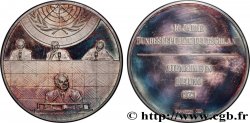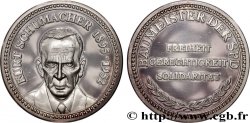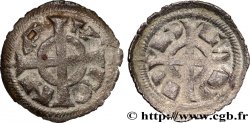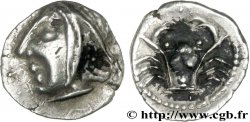50.00 €约 409.50 CNY
数量
加入购物车

种类 Médaille, August Bebel
日期: n.d.
铸币厂名称/城市 Allemagne
材质 silver
纯度、成色(用角密度) 999 ‰
直径 40 mm
模子方针 12 h.
重量 29,70 g.
侧面 lisse
印模 999
关于品相的说明
Patine hétérogène, aspect irisé et brillance de frappe. Présence de légères traces d’oxydation, de légères rayures et de traces de manipulation notamment sur la tranche et l’avers. La médaille a été nettoyée, ce qui a pour conséquence quelques marques de frottement.
正面
正面的文字 AUGUST BEBEL 1840. 1913.
正面的说明书 Portrait légèrement tourné vers la droite .
背面
背面的文字 BAUMEISTER DER SPD // FREIHEIT / GERECHTIGKEIT / SOLIDARITÄT.
背面的说明书 Légende semi-circulaire et en 3 lignes avec deux branches de laurier. Titrage: 999.
背面的翻译 BÂTISSEURS DU SPD // LIBERTÉ / JUSTICE / SOLIDARITÉ.
评论
Médaille sous capsule.
Ferdinand August Bebel, né à Deutz (près de Cologne) le 22 février 1840 et mort le 13 août 1913 dans un sanatorium près de Coire[3] en Suisse, est un artisan allemand devenu homme politique socialiste et féministe.
Autodidacte, il est une figure majeure de la social-démocratie révolutionnaire, et le dirigeant du plus important parti d'Allemagne, le Parti social-démocrate d'Allemagne (SPD).(c.f. Wikipédia).
Medal in capsule. Ferdinand August Bebel, born in Deutz (near Cologne) on February 22, 1840 and died on August 13, 1913 in a sanatorium near Chur[3] in Switzerland, was a German craftsman who became a socialist and feminist politician. Self-taught, he was a major figure in revolutionary social democracy, and the leader of the largest party in Germany, the Social Democratic Party of Germany (SPD). (see Wikipedia)
Ferdinand August Bebel, né à Deutz (près de Cologne) le 22 février 1840 et mort le 13 août 1913 dans un sanatorium près de Coire[3] en Suisse, est un artisan allemand devenu homme politique socialiste et féministe.
Autodidacte, il est une figure majeure de la social-démocratie révolutionnaire, et le dirigeant du plus important parti d'Allemagne, le Parti social-démocrate d'Allemagne (SPD).(c.f. Wikipédia).
Medal in capsule. Ferdinand August Bebel, born in Deutz (near Cologne) on February 22, 1840 and died on August 13, 1913 in a sanatorium near Chur[3] in Switzerland, was a German craftsman who became a socialist and feminist politician. Self-taught, he was a major figure in revolutionary social democracy, and the leader of the largest party in Germany, the Social Democratic Party of Germany (SPD). (see Wikipedia)








 对产品描述纠错
对产品描述纠错 打印
打印 分享我的选择
分享我的选择 提问
提问 Consign / sell
Consign / sell
 产品介绍
产品介绍















